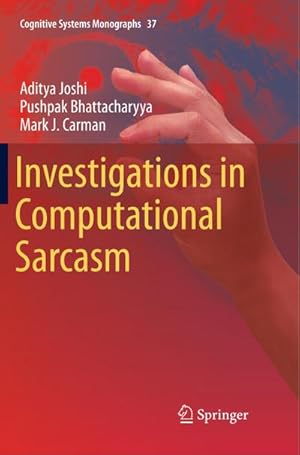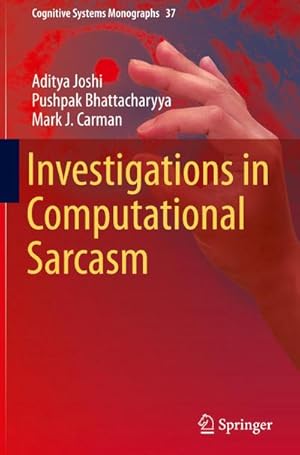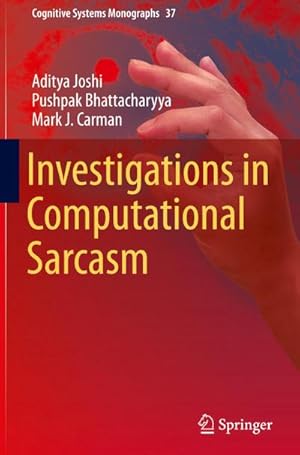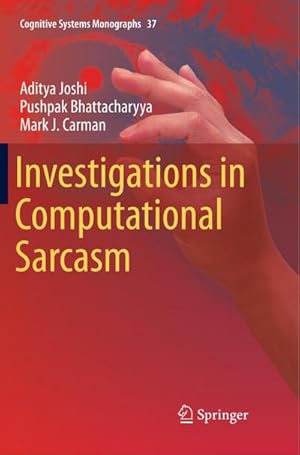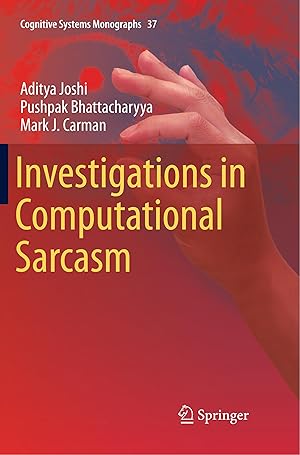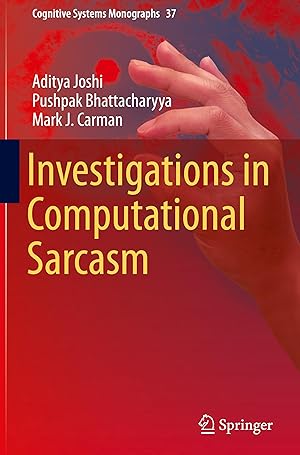Investigations Computational Sarcasm by Joshi Aditya (16 results)
FeedbackSearch filters
Product Type
- All Product Types
- Books (16)
- Magazines & Periodicals (No further results match this refinement)
- Comics (No further results match this refinement)
- Sheet Music (No further results match this refinement)
- Art, Prints & Posters (No further results match this refinement)
- Photographs (No further results match this refinement)
- Maps (No further results match this refinement)
- Manuscripts & Paper Collectibles (No further results match this refinement)
Condition Learn more
- New (15)
- As New, Fine or Near Fine (1)
- Very Good or Good (No further results match this refinement)
- Fair or Poor (No further results match this refinement)
- As Described (No further results match this refinement)
Binding
Collectible Attributes
- First Edition (No further results match this refinement)
- Signed (No further results match this refinement)
- Dust Jacket (No further results match this refinement)
- Seller-Supplied Images (8)
- Not Print on Demand (8)
Language (1)
Free Shipping
- Free Shipping to U.S.A. (No further results match this refinement)
Seller Location
Seller Rating
-
Investigations in Computational Sarcasm
Published by Springer Nature Singapore, 2018
ISBN 10: 9811083959 ISBN 13: 9789811083952
Language: English
Seller: Buchpark, Trebbin, Germany
US$ 14.53
Convert currencyUS$ 52.90 shipping from Germany to U.S.A.Quantity: 2 available
Add to basketCondition: Sehr gut. Zustand: Sehr gut | Sprache: Englisch | Produktart: Bücher.
-
Investigations in Computational Sarcasm
Published by Springer Nature Singapore, Springer Nature Singapore, 2019
ISBN 10: 9811341397 ISBN 13: 9789811341397
Language: English
Seller: AHA-BUCH GmbH, Einbeck, Germany
US$ 133.12
Convert currencyUS$ 34.56 shipping from Germany to U.S.A.Quantity: 1 available
Add to basketTaschenbuch. Condition: Neu. Druck auf Anfrage Neuware - Printed after ordering - This book describes the authors' investigations of computational sarcasm based on the notion of incongruity. In addition, it provides a holistic view of past work in computational sarcasm and the challenges and opportunities that lie ahead. Sarcastic text is a peculiar form of sentiment expression and computational sarcasm refers to computational techniques that process sarcastic text. To first understand the phenomenon of sarcasm, three studies are conducted: (a) how is sarcasm annotation impacted when done by non-native annotators (b) How is sarcasm annotation impacted when the task is to distinguish between sarcasm and irony And (c) can targets of sarcasm be identified by humans and computers. Following these studies, the book proposes approaches for two research problems: sarcasm detection and sarcasm generation. To detect sarcasm, incongruity is captured in two ways: 'intra-textual incongruity' where the authors look at incongruity within the text to be classified (i.e., target text) and 'context incongruity' where the authors incorporate information outside the target text. These approaches use machine-learning techniques such as classifiers, topic models, sequence labelling, and word embeddings. These approaches operate at multiple levels: (a) sentiment incongruity (based on sentiment mixtures), (b) semantic incongruity (based on word embedding distance), (c) language model incongruity (based on unexpected language model), (d) author's historical context (based on past text by the author), and (e) conversational context (based on cues from the conversation). In the second part of the book, the authors present the first known technique for sarcasm generation, which uses a template-based approach to generate a sarcastic response to user input. This book will prove to be a valuable resource for researchers working on sentiment analysis, especially as applied to automation in social media.
-
Investigations in Computational Sarcasm
Published by Springer Nature Singapore, Springer Nature Singapore, 2018
ISBN 10: 9811083959 ISBN 13: 9789811083952
Language: English
Seller: AHA-BUCH GmbH, Einbeck, Germany
US$ 133.12
Convert currencyUS$ 35.47 shipping from Germany to U.S.A.Quantity: 1 available
Add to basketBuch. Condition: Neu. Druck auf Anfrage Neuware - Printed after ordering - This book describes the authors' investigations of computational sarcasm based on the notion of incongruity. In addition, it provides a holistic view of past work in computational sarcasm and the challenges and opportunities that lie ahead. Sarcastic text is a peculiar form of sentiment expression and computational sarcasm refers to computational techniques that process sarcastic text. To first understand the phenomenon of sarcasm, three studies are conducted: (a) how is sarcasm annotation impacted when done by non-native annotators (b) How is sarcasm annotation impacted when the task is to distinguish between sarcasm and irony And (c) can targets of sarcasm be identified by humans and computers. Following these studies, the book proposes approaches for two research problems: sarcasm detection and sarcasm generation. To detect sarcasm, incongruity is captured in two ways: 'intra-textual incongruity' where the authors look at incongruity within the text to be classified (i.e., target text) and 'context incongruity' where the authors incorporate information outside the target text. These approaches use machine-learning techniques such as classifiers, topic models, sequence labelling, and word embeddings. These approaches operate at multiple levels: (a) sentiment incongruity (based on sentiment mixtures), (b) semantic incongruity (based on word embedding distance), (c) language model incongruity (based on unexpected language model), (d) author's historical context (based on past text by the author), and (e) conversational context (based on cues from the conversation). In the second part of the book, the authors present the first known technique for sarcasm generation, which uses a template-based approach to generate a sarcastic response to user input. This book will prove to be a valuable resource for researchers working on sentiment analysis, especially as applied to automation in social media.
-
Investigations in Computational Sarcasm (Cognitive Systems Monographs)
Seller: Books Puddle, New York, NY, U.S.A.
Condition: New.
-
Condition: New. pp. 156.
-
Investigations in Computational Sarcasm
Published by Springer Nature Singapore, Springer Nature Singapore Jan 2019, 2019
ISBN 10: 9811341397 ISBN 13: 9789811341397
Language: English
Seller: buchversandmimpf2000, Emtmannsberg, BAYE, Germany
US$ 129.55
Convert currencyUS$ 64.66 shipping from Germany to U.S.A.Quantity: 2 available
Add to basketTaschenbuch. Condition: Neu. Neuware -This book describes the authors¿ investigations of computational sarcasm based on the notion of incongruity. In addition, it provides a holistic view of past work in computational sarcasm and the challenges and opportunities that lie ahead. Sarcastic text is a peculiar form of sentiment expression and computational sarcasm refers to computational techniques that process sarcastic text. To first understand the phenomenon of sarcasm, three studies are conducted: (a) how is sarcasm annotation impacted when done by non-native annotators (b) How is sarcasm annotation impacted when the task is to distinguish between sarcasm and irony And (c) can targets of sarcasm be identified by humans and computers. Following these studies, the book proposes approaches for two research problems: sarcasm detection and sarcasm generation. To detect sarcasm, incongruity is captured in two ways: ¿intra-textual incongruity¿ where the authors look at incongruity within the text to be classified (i.e., target text) and ¿context incongruity¿ where the authors incorporate information outside the target text. These approaches use machine-learning techniques such as classifiers, topic models, sequence labelling, and word embeddings. These approaches operate at multiple levels: (a) sentiment incongruity (based on sentiment mixtures), (b) semantic incongruity (based on word embedding distance), (c) language model incongruity (based on unexpected language model), (d) author¿s historical context (based on past text by the author), and (e) conversational context (based on cues from the conversation). In the second part of the book, the authors present the first known technique for sarcasm generation, which uses a template-based approach to generate a sarcastic response to user input. This book will prove to be a valuable resource for researchers working on sentiment analysis, especially as applied to automation in social media.Springer Verlag GmbH, Tiergartenstr. 17, 69121 Heidelberg 156 pp. Englisch.
-
Investigations in Computational Sarcasm
Published by Springer Nature Singapore, Springer Nature Singapore Apr 2018, 2018
ISBN 10: 9811083959 ISBN 13: 9789811083952
Language: English
Seller: buchversandmimpf2000, Emtmannsberg, BAYE, Germany
US$ 129.55
Convert currencyUS$ 64.66 shipping from Germany to U.S.A.Quantity: 2 available
Add to basketBuch. Condition: Neu. Neuware -This book describes the authors¿ investigations of computational sarcasm based on the notion of incongruity. In addition, it provides a holistic view of past work in computational sarcasm and the challenges and opportunities that lie ahead. Sarcastic text is a peculiar form of sentiment expression and computational sarcasm refers to computational techniques that process sarcastic text. To first understand the phenomenon of sarcasm, three studies are conducted: (a) how is sarcasm annotation impacted when done by non-native annotators (b) How is sarcasm annotation impacted when the task is to distinguish between sarcasm and irony And (c) can targets of sarcasm be identified by humans and computers. Following these studies, the book proposes approaches for two research problems: sarcasm detection and sarcasm generation. To detect sarcasm, incongruity is captured in two ways: ¿intra-textual incongruity¿ where the authors look at incongruity within the text to be classified (i.e., target text) and ¿context incongruity¿ where the authors incorporate information outside the target text. These approaches use machine-learning techniques such as classifiers, topic models, sequence labelling, and word embeddings. These approaches operate at multiple levels: (a) sentiment incongruity (based on sentiment mixtures), (b) semantic incongruity (based on word embedding distance), (c) language model incongruity (based on unexpected language model), (d) author¿s historical context (based on past text by the author), and (e) conversational context (based on cues from the conversation). In the second part of the book, the authors present the first known technique for sarcasm generation, which uses a template-based approach to generate a sarcastic response to user input. This book will prove to be a valuable resource for researchers working on sentiment analysis, especially as applied to automation in social media.Springer Verlag GmbH, Tiergartenstr. 17, 69121 Heidelberg 156 pp. Englisch.
-
Investigations in Computational Sarcasm
Published by Springer-Verlag New York Inc, 2019
ISBN 10: 9811341397 ISBN 13: 9789811341397
Language: English
Seller: Revaluation Books, Exeter, United Kingdom
US$ 209.30
Convert currencyUS$ 13.44 shipping from United Kingdom to U.S.A.Quantity: 1 available
Add to basketPaperback. Condition: Brand New. reprint edition. 156 pages. 9.25x6.10x0.36 inches. In Stock.
-
Investigations in Computational Sarcasm
Published by Springer Nature Singapore Apr 2018, 2018
ISBN 10: 9811083959 ISBN 13: 9789811083952
Language: English
Seller: BuchWeltWeit Ludwig Meier e.K., Bergisch Gladbach, Germany
US$ 129.55
Convert currencyUS$ 27.04 shipping from Germany to U.S.A.Quantity: 2 available
Add to basketBuch. Condition: Neu. This item is printed on demand - it takes 3-4 days longer - Neuware - This book describes the authors' investigations of computational sarcasm based on the notion of incongruity. In addition, it provides a holistic view of past work in computational sarcasm and the challenges and opportunities that lie ahead. Sarcastic text is a peculiar form of sentiment expression and computational sarcasm refers to computational techniques that process sarcastic text. To first understand the phenomenon of sarcasm, three studies are conducted: (a) how is sarcasm annotation impacted when done by non-native annotators (b) How is sarcasm annotation impacted when the task is to distinguish between sarcasm and irony And (c) can targets of sarcasm be identified by humans and computers. Following these studies, the book proposes approaches for two research problems: sarcasm detection and sarcasm generation. To detect sarcasm, incongruity is captured in two ways: 'intra-textual incongruity' where the authors look at incongruity within the text to be classified (i.e., target text) and 'context incongruity' where the authors incorporate information outside the target text. These approaches use machine-learning techniques such as classifiers, topic models, sequence labelling, and word embeddings. These approaches operate at multiple levels: (a) sentiment incongruity (based on sentiment mixtures), (b) semantic incongruity (based on word embedding distance), (c) language model incongruity (based on unexpected language model), (d) author's historical context (based on past text by the author), and (e) conversational context (based on cues from the conversation). In the second part of the book, the authors present the first known technique for sarcasm generation, which uses a template-based approach to generate a sarcastic response to user input. This book will prove to be a valuable resource for researchers working on sentiment analysis, especially as applied to automation in social media. 156 pp. Englisch.
-
Investigations in Computational Sarcasm
Published by Springer Nature Singapore Jan 2019, 2019
ISBN 10: 9811341397 ISBN 13: 9789811341397
Language: English
Seller: BuchWeltWeit Ludwig Meier e.K., Bergisch Gladbach, Germany
US$ 129.55
Convert currencyUS$ 27.04 shipping from Germany to U.S.A.Quantity: 2 available
Add to basketTaschenbuch. Condition: Neu. This item is printed on demand - it takes 3-4 days longer - Neuware - This book describes the authors' investigations of computational sarcasm based on the notion of incongruity. In addition, it provides a holistic view of past work in computational sarcasm and the challenges and opportunities that lie ahead. Sarcastic text is a peculiar form of sentiment expression and computational sarcasm refers to computational techniques that process sarcastic text. To first understand the phenomenon of sarcasm, three studies are conducted: (a) how is sarcasm annotation impacted when done by non-native annotators (b) How is sarcasm annotation impacted when the task is to distinguish between sarcasm and irony And (c) can targets of sarcasm be identified by humans and computers. Following these studies, the book proposes approaches for two research problems: sarcasm detection and sarcasm generation. To detect sarcasm, incongruity is captured in two ways: 'intra-textual incongruity' where the authors look at incongruity within the text to be classified (i.e., target text) and 'context incongruity' where the authors incorporate information outside the target text. These approaches use machine-learning techniques such as classifiers, topic models, sequence labelling, and word embeddings. These approaches operate at multiple levels: (a) sentiment incongruity (based on sentiment mixtures), (b) semantic incongruity (based on word embedding distance), (c) language model incongruity (based on unexpected language model), (d) author's historical context (based on past text by the author), and (e) conversational context (based on cues from the conversation). In the second part of the book, the authors present the first known technique for sarcasm generation, which uses a template-based approach to generate a sarcastic response to user input. This book will prove to be a valuable resource for researchers working on sentiment analysis, especially as applied to automation in social media. 156 pp. Englisch.
-
Investigations in Computational Sarcasm
Seller: moluna, Greven, Germany
US$ 111.73
Convert currencyUS$ 57.59 shipping from Germany to U.S.A.Quantity: Over 20 available
Add to basketCondition: New. Dieser Artikel ist ein Print on Demand Artikel und wird nach Ihrer Bestellung fuer Sie gedruckt. Provides a tabular summary of the past work on computational sarcasmLays down the linguistic foundations for computational sarcasmPresents elaborate examples motivating each work module Describes approaches spanning multiple mac.
-
Investigations in Computational Sarcasm
Seller: moluna, Greven, Germany
US$ 111.73
Convert currencyUS$ 57.59 shipping from Germany to U.S.A.Quantity: Over 20 available
Add to basketCondition: New. Dieser Artikel ist ein Print on Demand Artikel und wird nach Ihrer Bestellung fuer Sie gedruckt. Provides a tabular summary of the past work on computational sarcasmLays down the linguistic foundations for computational sarcasmPresents elaborate examples motivating each work module Describes approaches spanning multiple mac.
-
Investigations in Computational Sarcasm (Cognitive Systems Monographs)
Seller: Majestic Books, Hounslow, United Kingdom
US$ 175.19
Convert currencyUS$ 8.73 shipping from United Kingdom to U.S.A.Quantity: 4 available
Add to basketCondition: New. Print on Demand.
-
Investigations in Computational Sarcasm
Seller: Majestic Books, Hounslow, United Kingdom
US$ 176.73
Convert currencyUS$ 8.73 shipping from United Kingdom to U.S.A.Quantity: 4 available
Add to basketCondition: New. Print on Demand pp. 156.
-
Investigations in Computational Sarcasm (Cognitive Systems Monographs)
Seller: Biblios, Frankfurt am main, HESSE, Germany
US$ 192.04
Convert currencyUS$ 11.70 shipping from Germany to U.S.A.Quantity: 4 available
Add to basketCondition: New. PRINT ON DEMAND.
-
Investigations in Computational Sarcasm
Seller: Biblios, Frankfurt am main, HESSE, Germany
US$ 193.68
Convert currencyUS$ 11.70 shipping from Germany to U.S.A.Quantity: 4 available
Add to basketCondition: New. PRINT ON DEMAND pp. 156.



